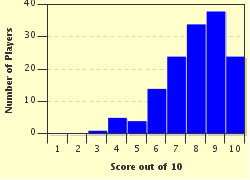Quiz Answer Key and Fun Facts
1. My grandfather and I were watching a politician on television who was lending his support to a controversial political candidate after criticizing that candidate's behavior. My grandfather turned to me and said, "He's trying to run with the hare, hunt with the hound". What in the world was my grandfather talking about?
2. I was attempting to buy my favorite brand of Scotch whisky but was a little hesitant because the label on the bottle did not look like the one to which I was accustomed to seeing. I expressed my concerns to the vendor by telling him I thought it might be a fake. He responded most assuredly, "Oh, no, no! This is the ____________!" What cliche did he use?
3. To "raise someone's hackles" is to make someone feel angry or fearful. However, what exactly are hackles?
4. What phrase do many people use when they wish to refer to an approximate measurement, a generally accurate guideline, or a principle based on experience rather than a precise standard?
5. Toby owned a hobby store that he had kept operating for forty-four years, but over the last few years, his business had lost a tremendous amount of money. After several weeks of thinking about his situation, Toby decided that it was finally time to close his business and bring an end to this part of his life. What cliche might he have used to express what he was doing?
6. Someone who has "returned to the fold" has come back to a place where he or she once lived or worked after having left and been away for awhile. However, to what does the word "fold" refer in this cliche?
7. To declare a day to be a "red-letter day" is to say that today is a most memorable day, a day you want to commit to memory. What is the source of this expression?
8. When someone is being severly chastised or reprimanded, then that person is being "raked over" what?
9. To "read between the lines" is to deduce that the true meaning of what you are reading or hearing is something other than what has been written or is being spoken. To what do we owe the origin of this cliche?
10. If you were having to go through a series of trials and tests or you were having to experience a number of people who were criticizing or attacking you, then what would you be doing, according to a particular cliche?
Source: Author
alaspooryoric
This quiz was reviewed by FunTrivia editor
ponycargirl before going online.
Any errors found in FunTrivia content are routinely corrected through our feedback system.

